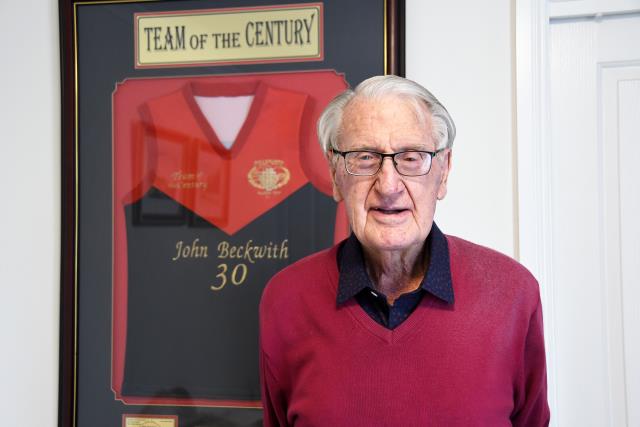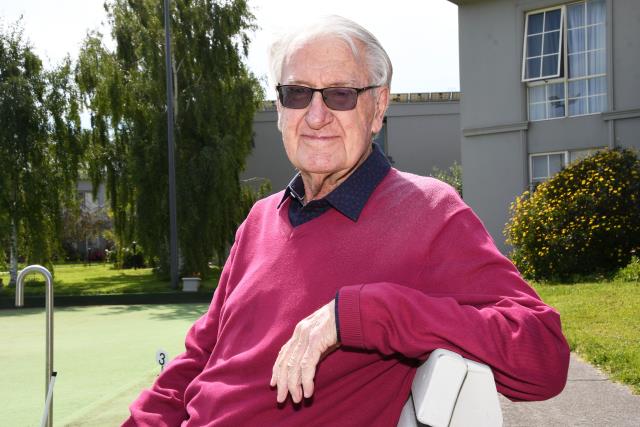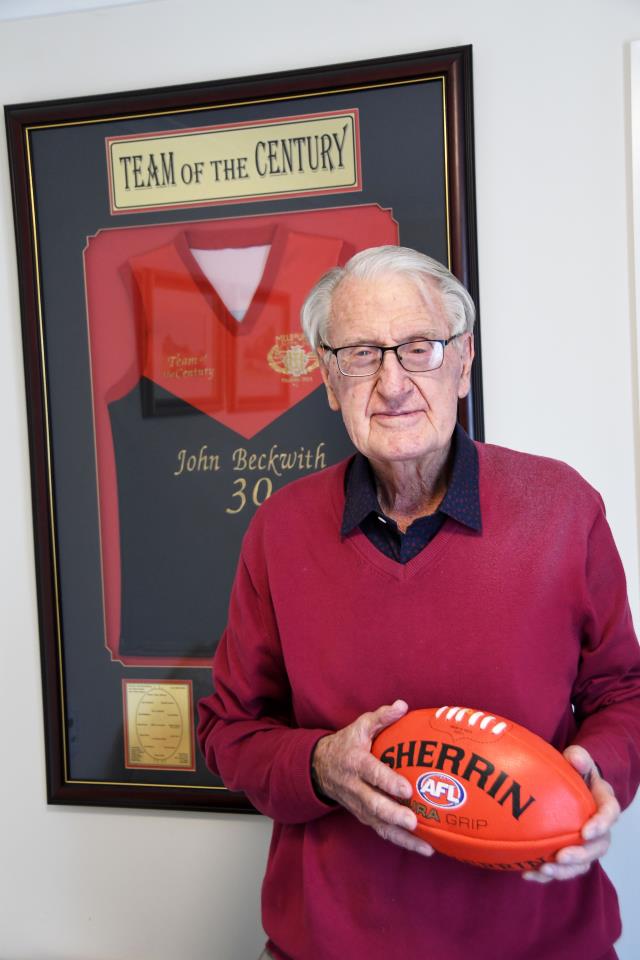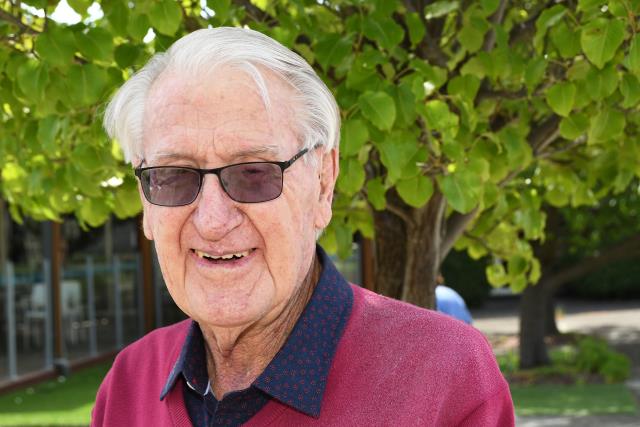By Marcus Uhe
John Beckwith watched with great delight from his Springvale retirement home as his beloved Demons ran away with the 2021 AFL Grand Final. He spoke to Gazette journalist MARCUS UHE about his career and why the victory carried extra significance for him.
Melbourne’s 2021 AFL Premiership was 67 years in the making for Melbourne Team of the Century member and Springvale resident John Beckwith.
He played in five premierships with the Demons, even captaining two over his 176-game career in the club’s golden era between 1951 and 1960, and earned selection as a back pocket in the club’s Team of the Century in 2000.
But for all the accolades and memorabilia, the loss in the 1954 Grand Final to Footscray (now Western Bulldogs), their only premiership for so long until 2016, was something that Beckwith struggled to escape.
“For 50 years after that we got invited as the Melbourne players of that day to come and celebrate the premiership,” Beckwith said.
“I went to Footscray (events) to listen to how well they played.
“It gets a bit grinding after a while.”
Melbourne embarked on a drought of its own following the 1964 premiership as the club experienced all kinds of tumult and tragedy.
From heartbreaking deaths, like Brownlow medalist and club icon Jim Stynes – and Troy Broadbridge – to catastrophic football dramas like humiliating grand final losses and a near merge with Hawthorn, things had never been the same at the Demons since Beckwith’s era under the great Norm Smith.
“For 57 years I’ve watched things go wrong for Melbourne,” Beckwith said
“So in the grand final when we were halfway through the third quarter and we were 19 points behind, I had that terrible sick feeling that it was going to happen again.
“I thought to myself, sitting there alone, ‘gee we need a couple of quick goals and we might get back in the game’ and within seconds, bang bang!, Bailey Fritsch got one, Ben Brown pushed a bloke in the back and kicked a third goal, so suddenly we’re back level.”
Melbourne took what was a close game for the first half and blew it to pieces in the second, kicking 16 of the last 17 goals of the game to put the result beyond any doubt.
“I’ve watched the replay 20 times, and I still can’t believe what happened in a quarter and a half; that they could do everything perfectly, even hitting a bloke’s shin and bouncing off to another player, that sort of stuff.
“We had four or five players, like little Jake Bowey only played four or five games before a grand final, so we had a lot of first year players in the side, and a lot of second and third year players who, all of a sudden, developed, almost instantaneously and played their best football.
“It’s a miracle for me.”
As the game evolves, not much remains the same from Beckwith’s days as a player. When asked who the modern day John Beckwith would be, he posited that the game had changed too much from his era to find a comparison.
But watching the Dees demolish teams as the season went along, he took great delight in seeing players like Charlie Spargo, Alex Neal-Bullen and Kysaiah Pickett harass and stalk their opponents.
“The sides I played with were very fierce tackling sides, so the opposition never got a chance to do anything with it.
“Melbourne now is just the same; it’s relentless with its pressure.”
When his playing days came to a close, Beckwith took some time away from the club before he returned to join the coaching ranks, and had the unenviable role of replacing Norm Smith in 1968.
Smith was already a revered figure at the club, playing in four premierships in his 210-game career before embarking on one of the greatest coaching careers the league has ever seen.
In his 310-game tenure as coach at Melbourne, he won six premierships between 1955 and 1964, including all five that Beckwith won, and led the club to every grand final between 1954 and 1960.
Beckwith still remembers the moment he had the job thrust upon him.
“Norm Smith had a heart attack in 1967 when I was the assistant coach.
“At half time at Carlton he walked into the rooms, grabbed his heart and said ‘Becky, you take over the last three games of the season’. So I coached the last three games and then I got the coaching job the next year.”
Despite being the reigning premiership winning coach, Smith had been sacked in 1965 amid tension between he and administrators. He was quickly reinstated before handing over to Beckwith in 1967 when he suffered health troubles.
Beckwith was not involved at the club when the bombshell dismissal took place but felt the repercussions of the sacking when he returned, as the ‘curse’ of Norm Smith set its foundations during his three seasons in charge.
“My main focus was to try and settle the club down and get them back going again because they were arguing with one-another and criticising one-another. And the club didn’t have a very good recruiting policy at all.
“We had no way of attracting players because all (the club) offered was a university course. Now, how many footballers are intelligent enough to go to university? There was only one in my time and that was (Peter) ‘Crackers’ Keenan.”
Unfortunately Beckwith did not enjoy the same success as a coach that he did during his playing days. He had to navigate the tricky task of coaching players like Harold ‘Hassa’ Mann, Brian Dixon and Robert ‘Tassie’ Johnson who were previously his premiership teammates.
The Demons did not feature in the finals in any of his years as coach winning just eight, three, and six games in 1968, 1969 and 1970, respectively.
These days Beckwith finds himself living in the Lexington Gardens Retirement Village in Springvale with his sister. His sporting activity is reduced to walking, as he no longer plays golf at Victoria Golf Club in Cheltenham, where he joined as a member as a 20-year-old.
His daughter Karen is now a keen golfer and his son Tony played baseball in the United States.
He’s recently been blessed with a great-grandson, Mack, who can now visit Beckwith at his retirement home with the easing of Covid restrictions.
He can see potential in the four-week-old already.
“He’s got a good grip, I noticed that when I grabbed his hand. He could be a golfer!”










